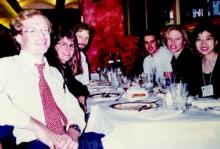It is with much sadness that we record the death of Eric Rambo, a founding member of the UCLA “Culture Club,” now the Yale Center for Cultural Sociology, on October 6, 2018. In 1985, Jeff Alexander asked a small group of graduate students who had taken his course on culture to join him in developing a cultural sociology study group. Alexander’s intention was to develop a cultural sociology that gives autonomy to culture, focusing on meaning, symbolic classification and ritual processes. In addition to Eric, the initial members included Elaine Chan, Laura Edles, Anne Kane, and Hannah Kully. Anne Kane recalls, “we were a pretty confused group at those early meetings, and it often seemed that Eric was the only one who appeared to grasp the agenda.” Alongside Jeff, Eric took a leadership role in what soon became known as “the culture club” – based on his keen intellect, a much wider reading of relevant non-sociology texts, and his outgoing and generous personality. Eric inspired and encouraged the rest of us, and by 1987 we had moved from a study group to an embryonic laboratory of intellectual innovation sharing a purpose and vision, that of “cultural sociology.” This program was crystallized with Alexander’s publication of the first two “strong program” articles, one on Watergate as ritual, the other on the embeddedness of computers in the sacred and profane. New members – Phil Smith, Agnes Ku, Andy Roth, Ron Jacobs, Steve Sherwood, and Jinlin Hwang (a Taiwan professor who died last year) – brought fresh ideas and energy. Soon, graduate student members began developing articles of their own for publication. One of the most important of these was Eric and Elaine Chan’s 1990 article “Text, Structure, and Action in Cultural Sociology,” in Theory and Society.[i] Ostensibly a review article, Rambo and Chan critiqued two prominent “competing” theories of culture, those of Robert Wuthnow and Margaret Archer. Along the way, they developed what became a fundamental theoretical concept of the strong program – the notion of a structure of culture, or culture structure. Other members’ publications soon followed.[ii] Each article represented the collective effort of the culture club that from the beginning met every month (including during Alexander’s sabbatical absences) to discuss one member’s manuscript and work on the larger project of the strong program of cultural sociology.
After earning his Ph.D. in 1992, Eric moved to Wisconsin for a position at U of W-Milwaukee, leaving the UCLA culture club he helped develop a veritable “institution.”[iii] Eric left academia in 1998, becoming an analyst and manager at an environmental consulting firm in Madison. He also found his passion in music and political activity as a leading member of the Madison (WI) Forward Marching Band. To the end, Eric Rambo continued to inspire people through humor, performative politics, and a deep sense of democratic principles.
Anne Kane and Jeffrey Alexander, with assistance from Elaine Chan and Agnes Ku
[i] Rambo, Eric and Chan, Elaine (1990) ‘Text, Structure, and Action in Cultural Sociology’, Theory and Society 19: 635–48.
[ii] In the early ‘90s, these include: Alexander, Jeffrey C. and Smith, Philip (1993) ‘The Discourse of American Civil Society: A New Proposal for Cultural Studies’, Theory and Society 22: 151–207; Edles, Laura Desfor (1995) ‘Rethinking Democratic Transition: A Culturalist Critique and the Spanish Case’, Theory and Society 24: 355–84; Kane, Anne E. (1991) ‘Cultural Analysis in Historical Sociology: The Analytical and Concrete Forms of the Autonomy of Culture’, Sociological Theory 9: 53–69. Smith, Philip (1991) ‘Codes and Conflict: Toward a Theory of War as Ritual’, Theory and Society 20: 103–38.
[iii] See Mustafa Emirbayer, 2004, ‘The Alexander School of Cultural Sociology’, Thesis Eleven, 79: 5-15, especially p. 9.
